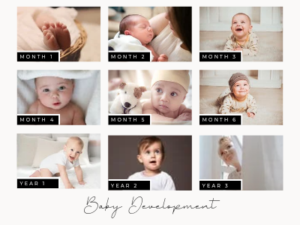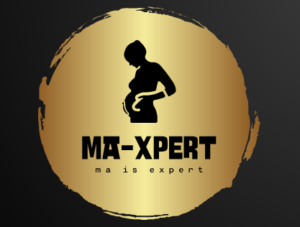From the time they are born, baby development and learn continuously, making them amazing tiny creatures. A child’s early years are full with important turning points that influence their growth. Parents and other caregivers can gain important insights into their baby’s needs and talents by being aware of these stages.
1) The First Few Months: An Exciting World To Baby Development
In the initial months of their lives, newborns go through a phase of fast baby development. They become more and more aware of their surroundings through their senses. One of the first senses to develop is touch, which is essential for bonding. Holding, stroking, and soft strokes assist in giving the infant a sense of security.

It takes longer for vision into baby development. Infants like to gaze at faces and are able to distinguish high contrast patterns. They become more adept at tracking moving things as they get bigger and have better visual acuity. You may encourage their growing vision by putting toys that contrast and are colorful in their field of sight.
Table of Contents
Toggle2) The Wonder of Motor Abilities in Baby Development:
Babies’ motor abilities develop together with their size. They first display reflexive behaviors, like the grab reflex, in which they cling to items out of instinct. These reflexes eventually develop into deliberate behaviors. During this period, tummy time becomes crucial for developing upper body and neck strength, which paves the way for subsequent activities like crawling.

Equally remarkable is the way fine motor skill development occurs. Babies begin to use their hands and fingers to examine items about six months of age. Refining these skills is aided by providing toys that are age-appropriate and promote grasping and manipulation. This eventually results in the thrilling turning point of being able to pick up little objects with your thumb and forefinger.
3) Blossoms of Language: From Gurbling to Words in Baby Development
Language development is a fascinating and gradual process. Early on, babies learn to communicate through gurgles, coos, and cries. Reacting to these vocalizations fosters a relationship of trust between the caregiver and the infant.
Around six months, newborns start to babble as they try out different consonant-vowel combinations. Even merely answering their babble counts as conversation and promotes language development. Months later, single words start to appear, ultimately building into short sentences. Early reading to infants is a great approach to encourage a love of language and storytelling.
4) Emotional and Social Bonds In Baby Development
From birth, babies are sociable creatures. They see how people around them behave and pick up relationship lessons from it. Around six to eight weeks, a sincere smile typically emerges, indicating the start of social response. A foundation of security and trust is established when you swiftly respond to a baby’s indications.
When a baby’s awareness of their environment increases, between six and eight months, separation anxiety may start to manifest. This is a normal developmental stage and an indication of a close bond with caregivers. Reassurance and reassuring rituals aid in getting through this stage.
5) Overcoming Obstacles: Acknowledging Developmental Delays
Although every infant develops at a different rate, it’s important for caregivers to be aware of any delays in development. Seeing medical professionals on a regular basis enables monitoring and, if necessary, early intervention. It is advisable to speak with a pediatrician about any delays in attaining developmental milestones or notable departures from normal development.
6) Appreciating Each Step
Every smile, every babbling sound, every little advancement in a baby’s development is enough for joy. Every baby is different, and they all hit milestones on different schedules. Healthy growth is promoted by creating a loving, caring, and appropriately stimulating environment.
A flourishing, developing child need its caretakers to be aware of their cues, celebrate their successes, and offer assistance when required. The years spent as a baby are an amazing adventure that reveal new things every day. A child’s future development and learning will have a solid foundation if they approach this trip with enthusiasm and patience.
